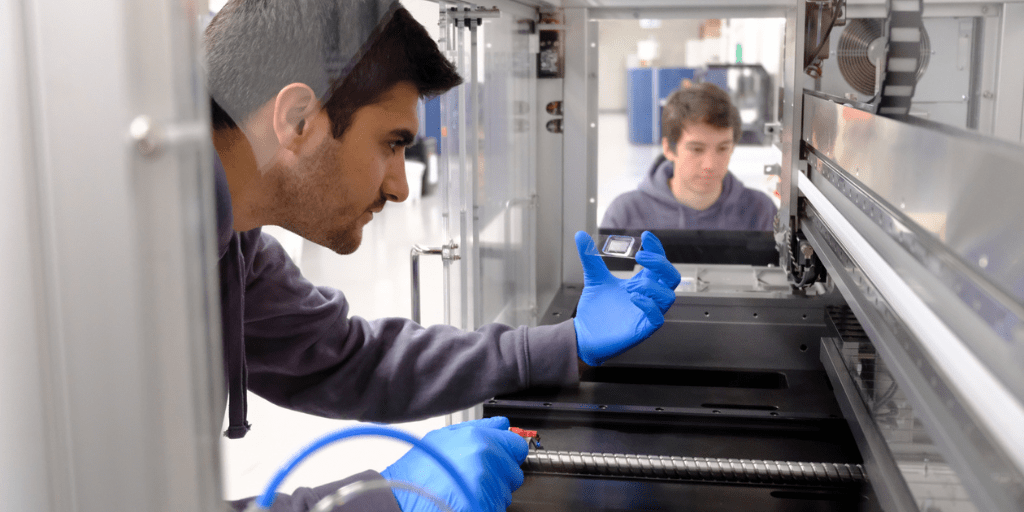
AI tools like ChatGPT are revolutionizing how the world generates text, images and code. In a similar way machine learning algorithms and generative AI are upending traditional processes in life sciences and collapsing time frames in drug discovery and materials development.
AlphaFold by DeepMind is probably the most well known machine learning model in this space. It predicts the 3D structure of a protein from its amino acid sequence and has been used by more than 1 million researchers over the 18 months in which it has been publicly available. Since then a plethora of other AI tools have emerged, such as the recently open-sourced RFDiffusion, a machine learning model which allows researchers to generate computational protein designs using just their laptop.
As AI thus makes rapid progress in the world of bits, translating those computational designs into physical, functioning proteins remains challenging. Adaptyv Bio has set out to address this with its next-generation protein foundry. Combining advanced robotics, microfluidics and synthetic biology techniques, Adaptyv Bio is building a full-stack platform to allow protein engineers to validate their AI-generated protein designs.
Julian Englert, CEO and co-founder at Adaptyv Bio said: “Proteins are at the core of the biorevolution, whether in the form of new medicines, better enzymes for research and industrial applications or as materials with novel properties. As a protein designer you now have access to incredible new AI tools such as AlphaFold or RFDiffusion. But validating your protein designs in the lab to see if they work remains a huge pain. Imagine every time you used Github Copilot to generate some code you had to wait 10 weeks for it to execute or to tell you that it had a bug. And imagine each execution costs 1000 USD. That’s pretty much the situation for protein designers today.”
The thing that AI models need the most is data – for training them and for improving the predictions they make. By making it easier to generate data about how well the designed proteins work, Adaptyv Bio allows protein engineers and AI models to get more feedback about their designs and helps them steer towards better performing proteins.
“Think of the AI in a self-driving car. In order to keep the car on the road and drive it to the destination, the AI model needs to have a tight feedback loop by getting lots of high-quality data from the car’s camera sensors. It’s pretty much the same principle for an AI model designing new proteins, just that the feedback mechanism here is actually making the proteins in our lab and testing how they perform” he added.
Adaptyv Bio was founded by a group of engineers from EPFL, the Swiss Federal Institute for Technology in Lausanne, born out of frustration by the tedious processes of running biological experiments in labs. In 2022, they raised $2.5 million in a pre-seed funding round led by Wingman Venture, after going through Y Combinator, the world’s most selective startup accelerator. By now, the team has grown to 12 engineers with diverse backgrounds ranging from synthetic biology to microengineering, software development and machine learning. The company is based at the newly built Biopole life science campus in Lausanne, Switzerland where the team is developing their technology in state-of-the-art lab facilities that include a scenic view over Lake Geneva and the Swiss-French alps.
At the heart of Adaptyv Bio’s foundry are protein engineering workcells — custom, automated setups that miniaturise processes usually requiring multiple laboratory machines, instead conducting them in parallel across tiny microfluidic chips. Users can write experimental protocols (or have AI write them for them) and the workcells then execute the experiments fully autonomously while tightly controlling and tracking the experiments’ parameters. All measurement data is automatically processed and uploaded to allow users to improve their machine learning models with each experiment.
Julian Englert said: ”Our workcells are fully automated, consume 1,000 times fewer reagents than any commercially available alternative, and we can run thousands of different proteins per day on each individual setup. To streamline the experimental workflows, we have developed a lot of custom synthetic biology and automation techniques. Over the next 12 months, we plan to scale up our lab further and increase the number of protein design applications we can support. We also just opened up early access for users to submit their protein design projects to us and we’re trying to onboard new projects as soon as possible”
In order to accelerate the field of protein engineering as a whole, Adaptyv Bio also open-sourced two of their internal tools which have already started gaining traction among researchers and engineers in the field. ProteinFlow is a Python library to allow protein designers to easily create high-quality datasets for better AI models. Automancer is an extensible software platform to run automated experiments, enabling researchers to build their own experimental protocols and integrate different laboratory instruments.
“Our mission is to make protein engineering easier and to enable more researchers to design new proteins. Take a look at the proteins that make up the incredibly powerful molecular machinery inside every single one of the cells in our body. Now imagine the kind of technological progress humanity could make if we could start designing novel proteins for personalized medicines, industrial applications like new enzymes, or better, more sustainable materials.” added Julian Englert.











